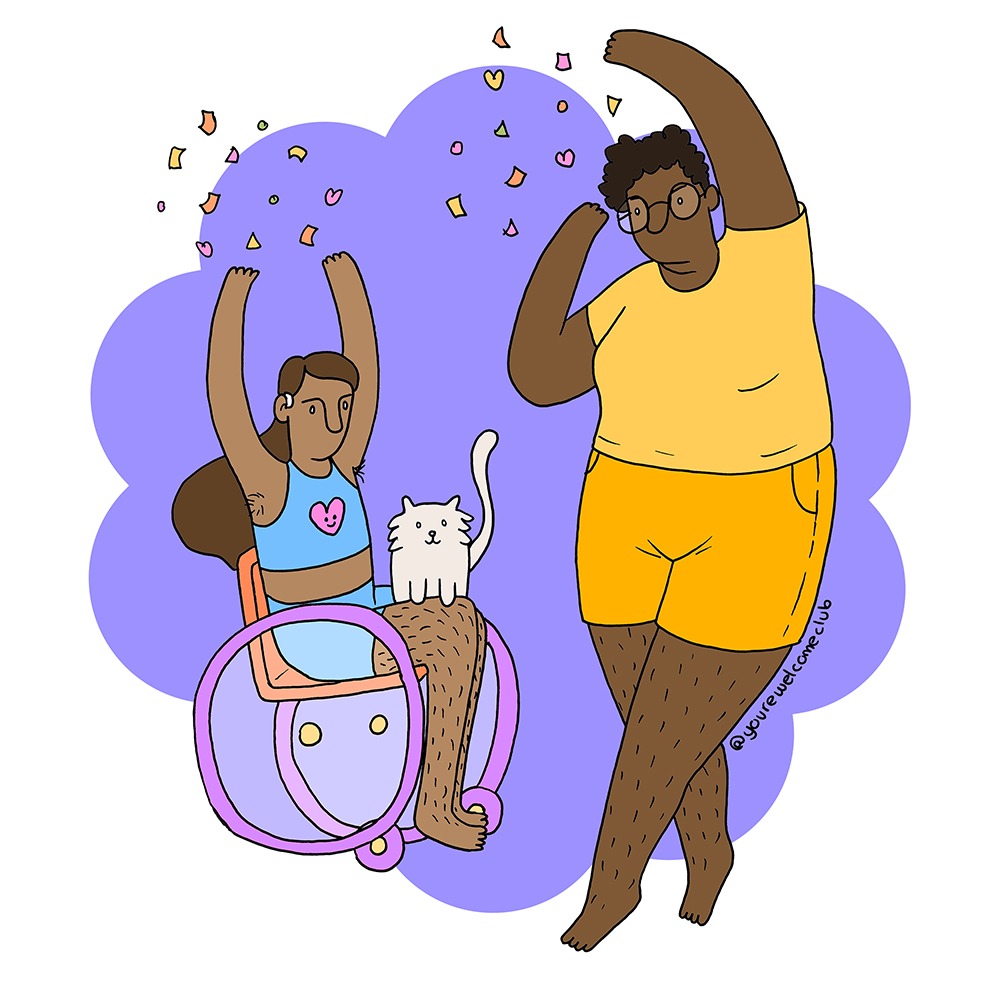Written by Ennis Rook Bashe.
Art by Hilde Atalanta.
Since my chronic illness became a serious condition, I have noticed how the queer community, even those educated on other social justice issues, don’t always know where to start when it comes to the disabled community. People act as if disability is a gross, sad thing and as if talking about it will ruin the moment. I want everyone to know that you can advocate for your disabled loved ones without being a buzzkill. In fact, showing that you care will deepen your relationship or friendship.
1. “Disabled” isn’t a bad word. Just say it.
“Disabled” isn’t a slur or an insult. By refusing to say “disabled,” you’re essentially saying that our identity and culture makes you so uncomfortable that you are going to pretend it doesn’t exist. Please see us. Acknowledge us. Many of us take pride in who we are. You can advocate for your disabled loved ones without being a buzzkill. By refusing to say “disabled,” you’re essentially saying that our identity and culture makes you so uncomfortable that you are going to pretend it doesn’t exist.
2. Listen to us when we disclose what we need.
Every disabled person is capable of different things. We have different accessibility needs, which might not be apparent at first glance. For example, it’s obvious that I use a cane. So it’s obvious that if I’m dating someone who lives in a walk-up, there’s going to be a long, long interval between when they buzz me in and when I knock on the door of their apartment. But I also need to scope out restaurant menus in advance to make sure they’re allergy-friendly, and chronic nausea means that kissing with tongue is often off the table. The people I love most let me know they’re comfortable discussing these subjects by asking questions like, “This is what I want to cook, how can I adapt the recipes for you?” and “Is cuddling like this okay for your neck?” When I’m surrounded by able-bodied people, making requests like “Hey, I need an extra restroom stop” or “Can we find somewhere to sit down?” can feel awkward, especially when you take into account the trauma of ableism. It means a lot to have someone on my side in those moments.
The people I love most let me know they’re comfortable discussing these subjects by asking questions.
On the other hand, sometimes what we need is the space and independence to handle a problem by ourselves- especially if it’s something that the abled people around us may not have the skills to handle, such as choosing rescue meds for a health crisis. In my opinion, there’s nothing worse than being (non-consensually) treated like a helpless child. Sometimes what we need is the space and independence to handle a problem by ourselves.
3. Our bodies aren’t always willing to compromise.
Capitalist ideals like “mind over matter” and “no pain, no gain” don’t always work for disabled people. The pressure to act like everything’s okay and go along with the crowd often causes people with less visible disabilities to ignore their health, which can have long-term consequences. I used to disregard my own needs by letting other people push me beyond my limits. For example, I once participated in a LARP event that often went far beyond scheduled hours, at times lasting all night, and whose designated sleeping area for people with disabilities was up several flights of stairs in the busiest part of the building. Despite the pain this caused me, I felt like I’d disappoint or even lose friends if I stopped committing to these games. After one particularly strenuous game, I spent several days only able to eat broth and ice chips, which led to me fainting at work and having to go home in a cab. I realized that my true friends wouldn’t want me to hurt myself. Sure, several people no longer talk to me, but it was for the best in the long run.
Disabled people use all of their strength just to take care of themselves and stay alive. When we say we can’t do something, we mean it. Knowing that people will understand when I say no gives me the confidence to set boundaries, and I think that’s true of many other disabled people as well.
Disability cuts across every demographic and marginalization. One in four adults- 61 million people in the United States alone- live with a disability. I like to remind people that everyone is temporarily able-bodied. Everyone who lives long enough will probably end up with some form of disability or health issue eventually. In the same way that wheelchair curb cuts in sidewalks are good for everyone, from punks on skateboards to parents pushing strollers, a lot of tools for interacting with the disabled community apply to everyone.
Don’t assume what someone can do. Pay attention to the needs and triggers of the people you love. Presume competence. Trust that if someone says they’re okay, they’re okay.
Disabled people may have knowledge and insight that seem mysterious to the abled community, but we’re just people. And we’re pretty cool.
About the Author
Ennis Rook Bashe is a disabled non-binary poet and YA fantasy novelist from the New York area, whose writing centers around themes of hope and community. Their new book is A Scheme of Sorcery. Ennis has received a Rainbow Awards honorable mention and is a Lesfic Bard Awards winner. They are also the author of several queer romance/speculative fiction novellas. Their novella To Stand in The Light features a bisexual superheroine with ADHD, and Graveyard Sparrow centers on a lesbian psychic who uses witchcraft to help manage their social anxiety.
Follow on IG: @ennisrook | Follow on Twitter: @@RookTheBird

